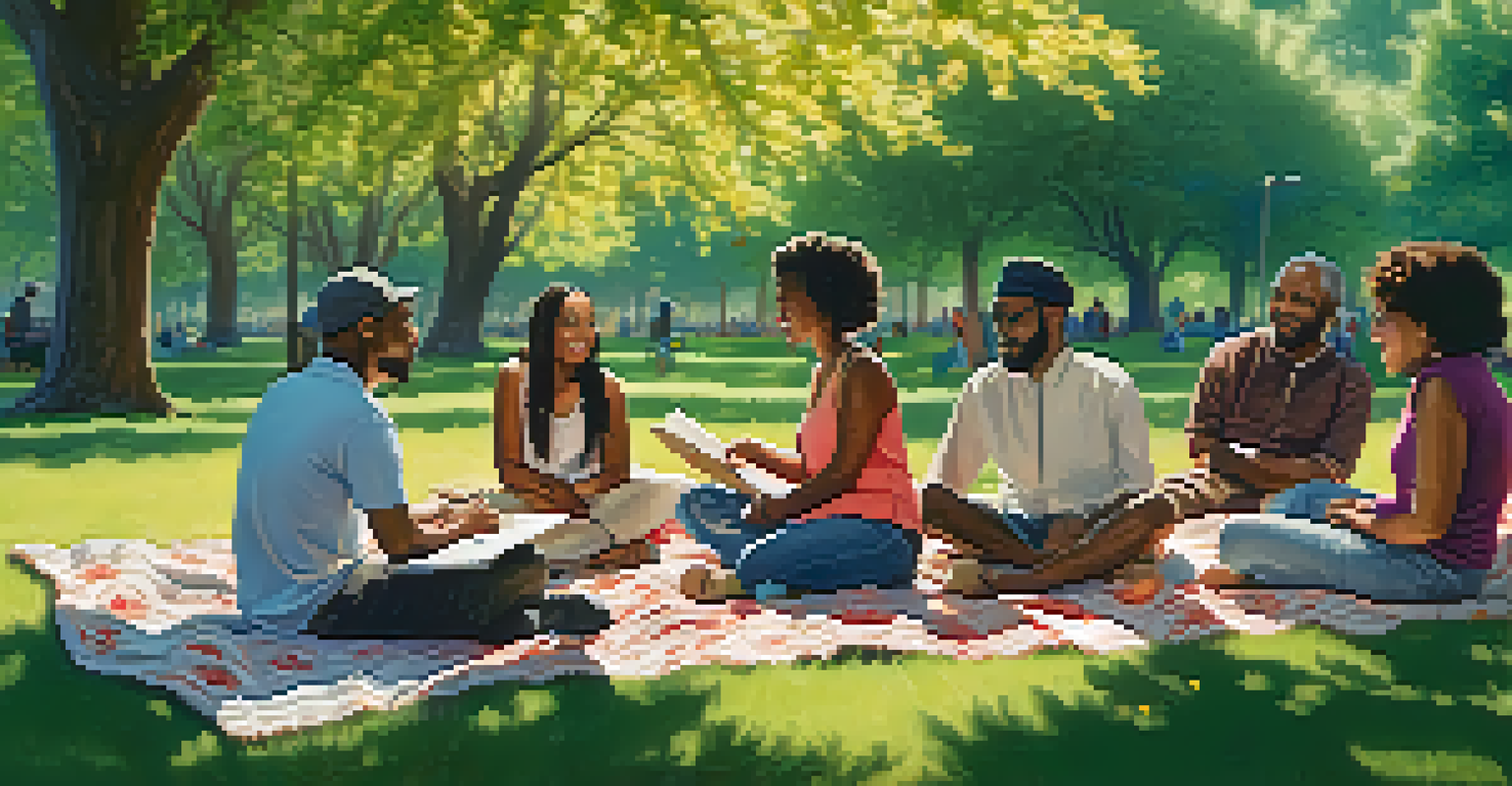The Impact of Lyrics on Personal Expression and Communication

Understanding the Role of Lyrics in Communication
Lyrics serve as a powerful medium for expressing thoughts and feelings. They encapsulate emotions that may be difficult to articulate in everyday conversations. By translating personal experiences into words, songwriters create a unique form of communication that resonates with listeners.
Lyrics are a way to express what you feel when you can't find the words.
When we listen to a song, we often find ourselves relating to its lyrics, making us feel understood. This connection can bridge gaps between different cultures and experiences, highlighting our shared humanity. In this way, lyrics become a universal language, fostering empathy and connection.
Moreover, lyrics can provoke thought and inspire action. They encourage listeners to reflect on their lives and sometimes challenge societal norms. This impact goes beyond mere entertainment; it can spark conversations and motivate change.
How Lyrics Facilitate Personal Expression
For many, writing or singing lyrics is a form of catharsis. It allows individuals to express their innermost feelings, whether it’s joy, sadness, or frustration. This release can be therapeutic, helping to process complex emotions in a creative way.

Additionally, lyrics can be a mirror reflecting our identities. They help us articulate who we are and what we stand for, often resonating with our personal beliefs and experiences. This is why a particular song can feel like it was written just for us.
Lyrics Foster Emotional Connection
Lyrics serve as a unique form of communication that resonates with listeners, bridging cultural gaps and fostering empathy.
The act of sharing personal lyrics, whether through social media or live performances, fosters a sense of community. It connects individuals who share similar experiences, creating a supportive network that values authenticity and vulnerability.
The Emotional Power of Song Lyrics
Song lyrics have the unique ability to evoke strong emotions. A single line can transport us back to a specific moment in our lives, reminding us of past loves, heartbreaks, or triumphs. This emotional resonance is what makes music such a significant part of our lives.
Music can change the world because it can change people.
Consider how a breakup anthem can make us feel understood and validated during tough times. Lyrics can articulate feelings we might not know how to express. They allow us to grieve, celebrate, or even heal through their storytelling.
Artists often draw from their own experiences, making their lyrics relatable and impactful. This authenticity shines through, creating a bond between the artist and listener that transcends mere entertainment.
Lyrics as a Tool for Social Commentary
Many artists use lyrics to comment on social issues, making music a vehicle for change. By addressing topics like inequality, mental health, and politics, they raise awareness and encourage listeners to think critically about the world around them.
For example, songs like 'Fight the Power' by Public Enemy highlight societal injustices and inspire movements. These powerful lyrics can galvanize listeners, prompting them to engage in discussions and activism.
Music as a Catalyst for Change
Many artists use their lyrics to address social issues, empowering listeners to engage in critical conversations and activism.
This form of expression not only informs but also empowers individuals to voice their opinions. Lyrics become a rallying cry, uniting people under a common cause and instilling a sense of purpose.
The Influence of Lyrics on Mental Health
Lyrics can play a significant role in shaping mental health. Many people find solace in songs that reflect their struggles, providing comfort in knowing they are not alone. This connection can be especially vital during challenging times.
Moreover, lyrics can serve as a source of inspiration and motivation. Uplifting songs with positive messages can help listeners overcome obstacles, promoting resilience and hope. They remind us that healing is possible and that we can rise above our challenges.
In this way, music becomes a therapeutic tool. It not only helps in processing emotions but also encourages proactive steps toward mental well-being, making lyrics a valuable ally in our mental health journey.
The Cultural Significance of Lyrics
Lyrics often reflect the cultural zeitgeist, capturing the essence of a particular time and place. They can be a powerful commentary on societal trends, values, and struggles, making them a historical record of sorts.
For instance, the rise of hip-hop in the 1980s brought attention to the experiences of marginalized communities. Lyrics from this era highlight issues like poverty, racism, and resilience, shaping our understanding of cultural dynamics.
Lyrics Shape Identity and Belonging
The lyrics we connect with often help shape our personal identities, providing validation and a sense of belonging, especially during formative years.
As cultures evolve, so do the themes and messages in lyrics. This ongoing dialogue through music enriches our collective narrative and fosters a deeper appreciation for diverse perspectives.
Lyrics and Personal Identity Formation
As we grow, the lyrics we resonate with often shape our personal identities. Music can provide a sense of belonging, especially during adolescence, when individuals are exploring who they are. Lyrics can validate our feelings and experiences, helping us navigate our identities.
For example, LGBTQ+ artists often write lyrics that resonate with those exploring their sexuality or gender identity. These songs can empower listeners to embrace their true selves, fostering a sense of pride and acceptance.

In this way, lyrics become a part of our life story, influencing how we see ourselves and our place in the world. They encourage self-exploration and authenticity, allowing us to celebrate our individuality.
The Future of Lyrics in Digital Communication
As we move further into the digital age, the way we interact with lyrics is evolving. Platforms like TikTok and Instagram allow users to share snippets of songs, creating new forms of engagement and expression. This shift is changing how we connect with music and each other.
Now, lyrics can go viral, sparking trends and conversations in real-time. This immediacy can amplify the reach of powerful messages, connecting diverse audiences across the globe.
Looking ahead, the role of lyrics in personal expression will continue to grow. As technology advances, we can expect even more innovative ways to communicate through music, further bridging the gap between artists and listeners.